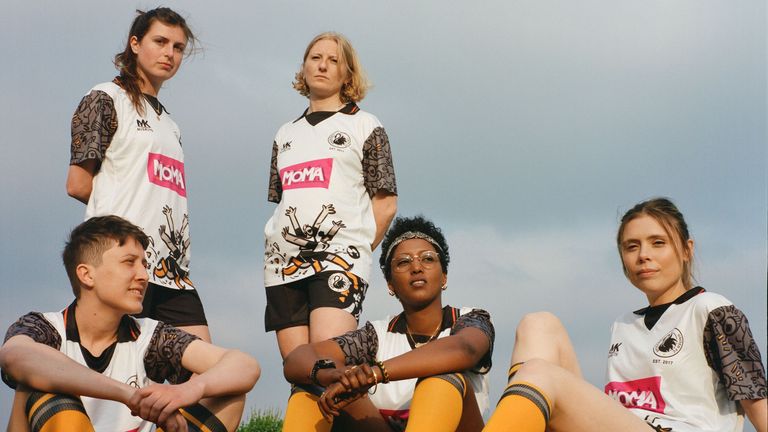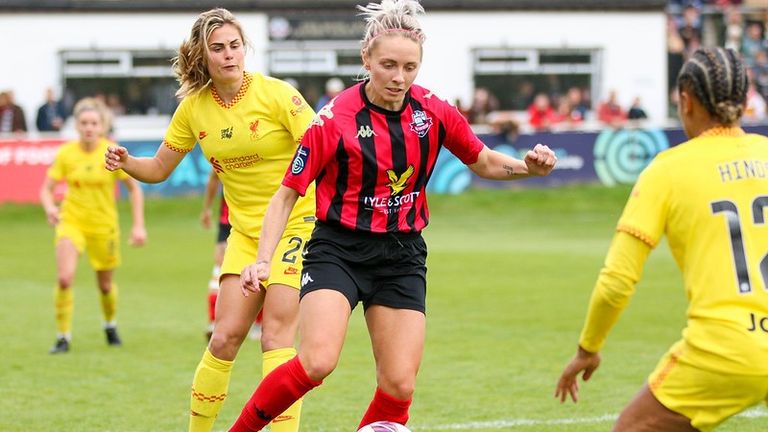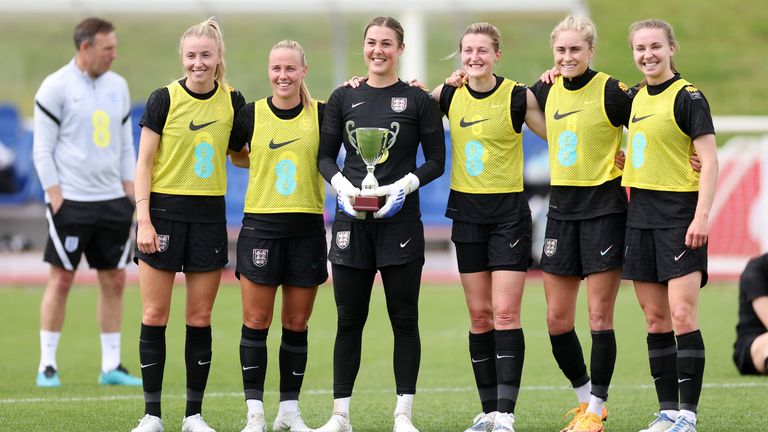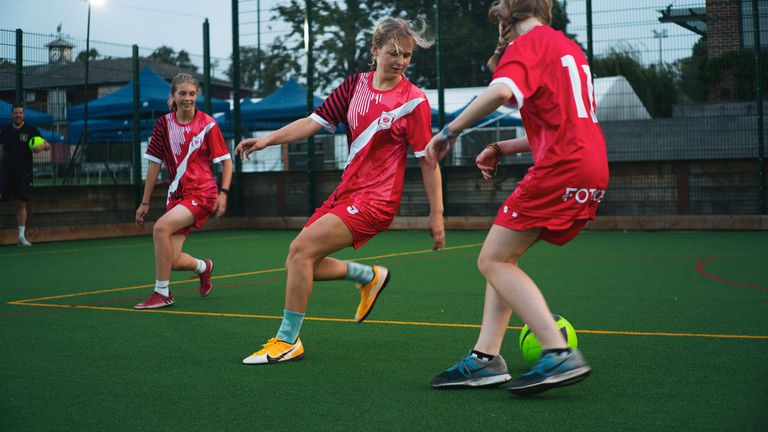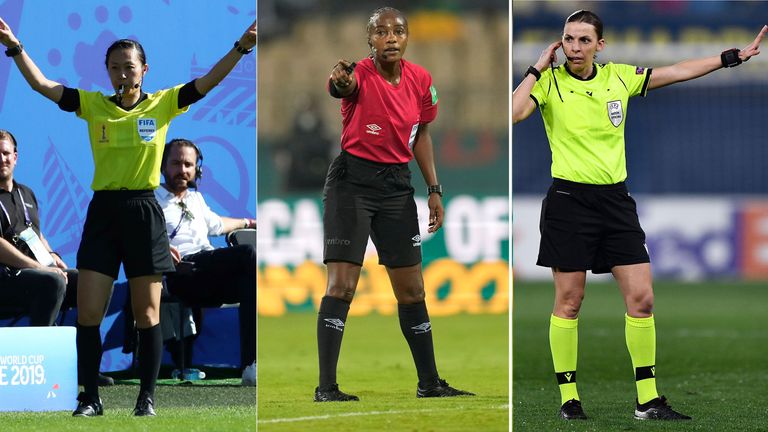[ad_1]
Women’s football continues to grow in popularity in England, with more people than ever watching live games.
Off the back of strong ticket sales for the Euros this summer and the record attendance at this year’s Women’s FA Cup final, the Department for Digital, Culture, Media and Sport announced that an in-depth review of domestic women’s football will be launched in the summer.
No date has been confirmed for the review, but it will aim to find ways to close the gap with the men’s game at an elite and professional level, as well as at the grassroots.
It is 101 years since women’s football was banned by the FA on the grounds that the sport was “quite unsuitable for females”, a date marked by London-based amateur club Goal Diggers FC (GDFC), whose kit is etched with 1921 on the back to highlight the “100 years of defiance women have shown by simply playing the game”.
The ban was maintained for 50 years, and the game has slowly grown since, with more progress in recent years with live broadcasts on both Sky Sports and the BBC.
Sky’s average audience for women’s football this season was 133,300, while the BBC’s was 717,333, according to data gathered by the FA.
Amateur clubs have told Sky News that two of the biggest problems they have seen in grassroots football are access to safe facilities and a pathway in the game.
Eleanor Levitt said her club, Brockwell United FC, have found it difficult to find pitch space that is safe and welcoming.
“I have refused opportunities because I can’t, in good conscience, have players walking around at night, especially being a south London team who play so close to where Sarah Everard went missing,” she told Sky News.
Sophie Page, who is Brockwell United’s club secretary, added that since she joined in 2018 she has played in four different training facilities.
Growth has come from the grassroots
This was reiterated by other London based clubs, including GDFC and South London Laces FC, who were recently booted out of their training facility and replaced by a corporate men’s league.
Gaia Laidler, who plays for GDFC, told Sky News the growth “has come from grassroots volunteers” but added “the demand for pitches is there but there aren’t many places for women to play”.
“One of the big barriers is access to pitches and space in London has been allocated on a first-come-first-serve basis but it’s not fair when women’s teams are just starting up, they cannot get into spaces which have been block-booked by men’s teams. At one point, we were playing with 60 players on a seven-a-side pitch.”
Pitches ‘catered toward men’
Beth Towle, who is the co-founder of South London Laces FC, said it’s not safe for women to play in facilities late at night, which are hard to access, adding that her club has experienced men watching or shouting at them while they play.
“It’s even the simple things like a sanitary bin in the toilets and safe changing rooms for players. The infrastructure is currently catered towards men,” she said.
Charlie Dobres, who is the director at semi-professional side Lewes FC, said the availability of pitches in England is limited when compared with continental Europe.
“The number of pitches where guys have no problem playing, don’t feel safe for women. Sports should be a right rather than a privilege,” he said.
Romina Calatayud, who is the founder of Girls United FC, added that women need safe spaces to play, including facilities with changing rooms.
A clear pathway
Another issue that was raised was the lack of a clear pathway for girls and women into the professional game.
Romina said some members of her club are forced to travel for more than an hour because there are only eight leagues for girls in London.
According to a survey conducted by Women In Sport in March, more than a million girls lost interest in sports as teenagers.
Catherine Forshaw, who is a sports lawyer at Brabners and co-founder of Women’s Football Education, said there needs to be a “spread of resources, whether that’s coaching, financials or medical” so players are looked after from a young age.
Fellow co-founder Danielle Bamber added it is important to engage with schools because “that’s the level where you start playing before you go to clubs”.
Brockwell United said many of its members stopped playing football in their teens because there wasn’t a pathway in the game for women.
According to Brockwell United’s Eleanor Levitt, there is also a lack of female referees and coaches, with many getting to a certain level and dropping out.
“I’ve literally never been refereed by a woman since I have been playing. Visibility is so important, if people start seeing female referees, then it will be an attractive career,” she said.
Create stepping stones for women and girls
According to the FA, there were more than 34,000 female coaches and 2,146 female referees in 2020 and there has been some progress, as shown by FIFA’s recent announcement that three female referees will officiate at the men’s World Cup in Qatar this winter.
However, the numbers are significantly lower than for men, with FA data showing there were 83,000 male coaches and 26,000 male referees in May 2020.
Yvonne Harrison, who is the chief executive of Women in Football, says these pathways don’t exist for women.
“Women are underrepresented at every level, whether that is playing sports, volunteering, coaching or working in it, particularly when you go higher up in leadership roles,” she said.
“There are women in leadership roles, but they are fewer. Encouragingly, we are seeing positive moves from organisations in the football industry to change this and we’re working with to support them. Pathways are very important from a participation point of view.
“One of our Get Onside ambassadors, who was coaching at a men’s grassroots clubs, told us she was pushed into administrative roles and yet she wanted to coach.
“We know seeing women in these roles is so important. Sian Massey-Ellis pledged to support three aspiring female officials to join her on a women’s select training day through Get Onside. We know how important this is, you have to see it, to be it.”
Romina Calatayud said Girls United’s Love The Game programme creates stepping stones so dropouts occur less often, and she believes this can be replicated nationally.
What should the government review look at?
Brockwell United suggested more funding is needed down the women’s football pyramid and more women need to be sitting on football boards, making decisions.
Meanwhile, Lewes FC’s Charlie Dobres said there is a “huge” need to develop grassroots women’s football, with engagement between key stakeholders and decision-makers fundamental.
“Rebuild it culturally so little girls understand and accept that football is for everybody,” he said.
“It is so important to create opportunities for young girls to see football as a thing. The coverage from Sky and BBC has been a game-changer.
“There is a real uptick in interest, but they have to have the facilities and opportunities to play, from primary school.”
Charlie added that funding for football needs to be distributed across the 100 professional teams, adding that Lewes FC is calling for a larger prize draw for the women’s FA Cup.
On 24 May, the FA announced the Empowering For Success strategy, which will see £1m of investment from the Premier League over the next three years to strengthen the third and fourth tiers of English women’s football and enable it to “flourish both on and off the pitch through the development of players, workforce and infrastructure”.
Read more from Sky News:
Deal struck to ensure men and women internationals earn the same in the US
Independent football regulator set for football
Two-thirds of English football league clubs have all-male boards
Grassroots football league for women and non-binary players suspends fixtures
Girls United FC’s Romina Calatayud said the review comes at an important time for the sport.
“We are able to decide how we want to build the future of the game. We are at this crossroad and grassroots needs to be put at the forefront, so we can feed up through the game,” she said.
“We need to go beyond comparing to the men’s game.”
On 25 April, sports minister Nigel Huddleston told the Commons that the government is “right behind women’s sport in every aspect”.
He said: “As well as the women’s football review; I am also pleased to confirm that the FIFA Women’s World Cup and UEFA European Women’s Championship Finals will be added to the listed events regime.
Follow the Daily podcast on Apple Podcasts, Google Podcasts, Spotify, Spreaker
“As a result, the tournaments will continue to be available to free-to-air television broadcasters; hopefully inspiring the next generation of Lucy Bronzes and Ellen Whites.”
[ad_2]


